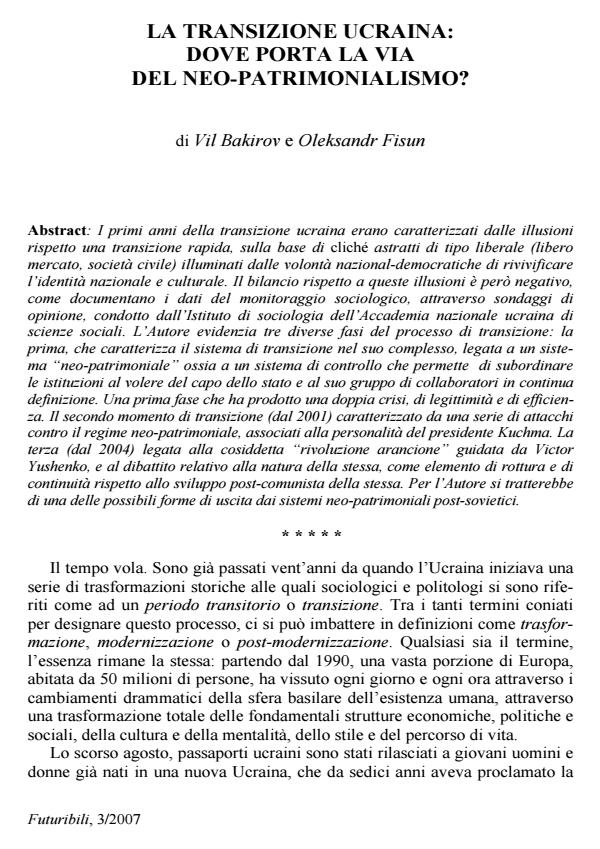La transizione ucraina: dove porta la via del neo-patrimonialismo?
Titolo Rivista FUTURIBILI
Autori/Curatori Vil Bakirov, Oleksandr Fisun
Anno di pubblicazione 2008 Fascicolo 2007/3
Lingua Italiano Numero pagine 15 P. 139-153 Dimensione file 169 KB
DOI
Il DOI è il codice a barre della proprietà intellettuale: per saperne di più
clicca qui
Qui sotto puoi vedere in anteprima la prima pagina di questo articolo.
Se questo articolo ti interessa, lo puoi acquistare (e scaricare in formato pdf) seguendo le facili indicazioni per acquistare il download credit. Acquista Download Credits per scaricare questo Articolo in formato PDF

FrancoAngeli è membro della Publishers International Linking Association, Inc (PILA), associazione indipendente e non profit per facilitare (attraverso i servizi tecnologici implementati da CrossRef.org) l’accesso degli studiosi ai contenuti digitali nelle pubblicazioni professionali e scientifiche.
The Ukrainian transition: Where will the path of neo-patrimonialism lead? The first years of transition in the Ukraine were marked by aspirations for a rapid process along the lines of abstract liberal clichés (free market, civil society) enlightened by a national-democratic desire to revive the national and cultural identity. These aspirations have not been met, as is shown by the sociological monitoring carried out through opinion polls by the Sociological Institute of the Ukrainian National Academy of Social Science. The authors identify three phases in the transition process. The first, which characterised the overall system of transition, was bound up with a neo-patrimonial regime, that is to say a system of control which subordinates institutions to the will of the head of state and his constantly changing circle of collaborators. This first phase is judged to have produced a dual crisis: of legitimacy and efficiency. The second phase, starting in 2001, was marked by a series of attacks on the neo-patrimonial regime linked to the personality of president Kuchma. The third phase, starting in 2004, was marked by the orange revolution led by Victor Yushenko and the debate on the nature of the revolution itself as a break with the post-Communist development hitherto. The authors advance the interpretation of this transformation as one of the ways of shaking off post-Soviet neo-patrimonial systems.
Vil Bakirov, Oleksandr Fisun, La transizione ucraina: dove porta la via del neo-patrimonialismo? in "FUTURIBILI" 3/2007, pp 139-153, DOI: